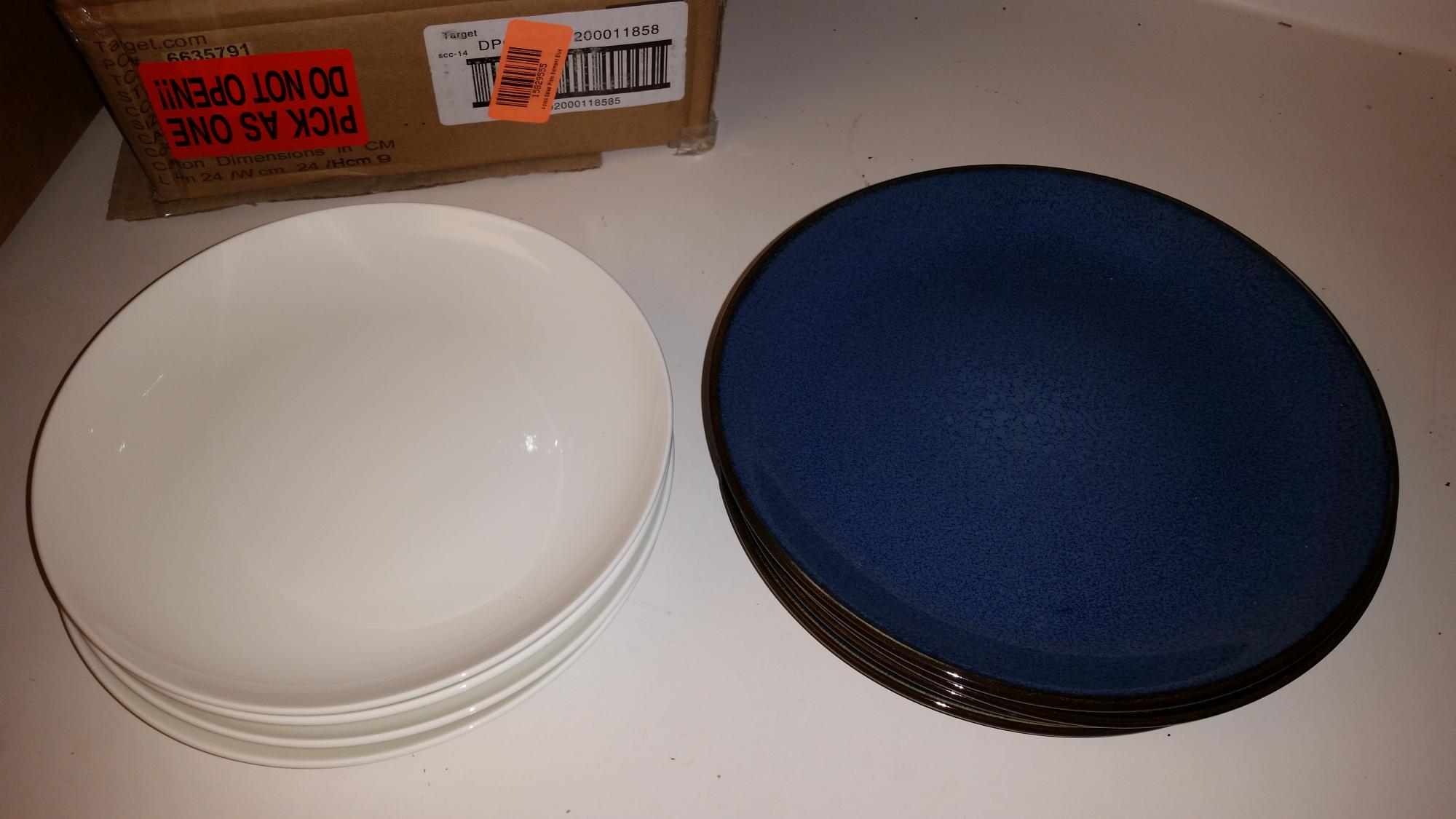An Apple a Day Made Me Fat
How many times have you heard, "If you eat healthy food, then you can eat as much as you want and not gain weight?" I have heard this many times online, on news, in books, etc., but it is not true. Eating healthy food can make you fat: consuming more calories than calories burned leads to weight gain. Let's use my numbers as an example. (I apologize to anyone who doesn't like numbers, but this is important.)
I gained 30 pounds over the course of 10 years. That means over the course of ten years I consumed 105,000 more calories than I burned because one pound is equal to 3500 calories. That means per day (there are 365.25 days in ten years) I consumed 28.7 more calories than I burned. There are 72 calories in a medium size apple 2-1/2" in diameter. That means, if I had not eaten one medium sized apple a day, I would have lost weight!
Okay so there are other health benefits to apples, like fiber, vitamins, minerals, etc. and this may be an over simplification, but I hope you get my point. Eating too much of a good thing does not lead to a good thing. Portion size matters no matter what you are eating. All calories count.
It is true that the source of the calories matters too. A 72 calorie apple provides more nutrition than a 72 calorie cookie. Both contain sugar, but the apple contains more vitamins and dietary fiber while the cookie contains more fat and sodium. And the apple should leave you feeling more "full" than the cookie due to the dietary fiber.
Ultimately, the apple is the better choice. But one cannot live on apples alone. Nor can one avoid cookies forever. Balance and moderation are key. In the diet section of the blog, I will share healthy, tasty recipes that I have enjoyed for years as well as new ones that I either stumble across or you share with me.
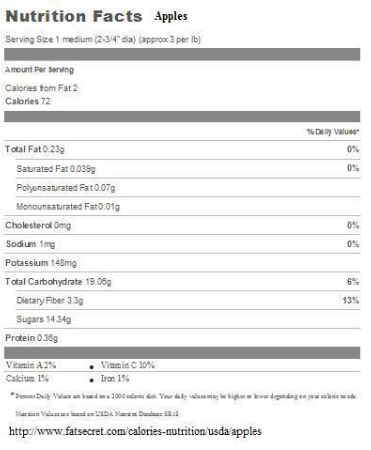

Size Matters!
Subconscious Cues of Plate Size and Color in Food Consumption
As I was looking at my food pictures, I started thinking that I should buy new plates to improve the aesthetics. Of course, I am the kind of person that likes to research everything and turn something that should be a simple decision into a complicated, overthought dilemma. As such the process of buying new plates brought out the following research questions:
1- How can I maximize the aesthetics of my pictures and simultaneously use visual cues to eat less food and achieve my weight goals?
2- What size plates should I buy? What size are my current plates vs the plates I used in college?
3- What color plates should I buy? Are there colors to help decrease hunger and increase meal satisfaction?
We eat with our eyes; a large portion of the dining experience is visual, and using visual cues you CAN trick yourself into feeling more full on less food. There is plenty of evidence on the psychology of visual perception and how the arrangements of objects can influence our perception of the objects. In addition the contrast between those objects effects our perceptions as well. Researching sensation and perception contributions to enhance the dining experience led me to Brian Wansink, Ph.D., the author of “Mindless Eating”.
The size of the plate plays a bigger role in food consumption than just how much food the plate can hold. Physically, a smaller plate holds less food than a larger plate, so the diner eats fewer calories when the food is served on a smaller plate because the diner was given a smaller portion. But at home wouldn't the person just fill a smaller plate twice to eat just as much food or more similar to dining habits at a buffet? Often times the answer is no. Psychologically, a smaller plate allows the diner to feel more full on less food.
Psychology sneaks into our dining experience and plate size influences hunger satiation subconsciously. This has to do with the visual illusion called the Delboef illusion first documented by Franz Joseph Delboeuf in the 1860s. When a circle is placed inside another circle, the size of the inner circle is perceptually influenced by the size of the outer circle. As the outer circle increases in diameter, the inner circle appears to get smaller even though the inner circle’s diameter has not changed.
According to Dr. Wanskin’s research, the average person will eat 92% of the food they serve themselves, and the average person fills about 70% of the plate regardless of plate size. In the early 1990s, the standard size for place settings (plates, bowls, cups, etc.) increased. The dinner plate size increased from 10-inches to 12-inches. This increase leads to you eating approximately 22% more food at a meal.[2] So if your meal was 1000 calories on the 10-inch plate, then you are eating 1220 calories on the 12-inch plate, and you subconsciously feel the same fullness. Being generous, suppose you only overate 220 calories per day and not per meal, then 220 calories/day means you would gain one pound every 16 days. And in ten months you would have gained 20 pounds.
Out of curiosity, I decided conduct an at home experiment with the dinner plates I have used for the last ten years and compare those plates to the plates I used in college.
1- measure the diameter of each type of plate
2- measure same amount of food on each plate and compare visual impression.
Results:
1- The current plates vary slightly.
Green = 11.5-inches,
fruit plates 10.5-inches
Holy cow. I remember purchasing the green dinnerware when I moved into my apartment. I was so excited to have a nice grown-up set of dishes, and I thought they were so pretty. At the time, I remember thinking they were large, but I had no idea of the consequences.
2- Served 1 cup pasta with ½ cup sauce on each dinner plate.
The serving on the large green plate looks smaller
than the serving on the small orange plate.
Color Cues
The next question that needs to be answered before making my purchase: what color plate should I buy? Similar to plate size, color plays an important role in tricking your mind while eating. Another study by Wanskin and van Ittersum at Cornell University shows that plates with the most color contrast with the food can trick you into eating less. In the study, subjects were given white or red plates and then told to serve themselves pasta with red sauce or pasta with while Alfredo sauce. Subjects who were given red plates and served pasta with red sauce and ate 22% or 32 grams more than subjects with white plates with red sauce. Conversely, for the Alfredo sauce, subjects with white plates served and ate more. [3] In addition, “reducing the color-contrast between the dinnerware and its background (i.e. table, tablecloth or placemat) helps reduce over-serving by as much as 10%.” Hmm, I guess I need to buy placemats too.
There have been numerous studies to find the "best" plate color to encourage eating less, but many of these studies seem to contradict each other. One study suggests red plates are best because we socially associate the color red with danger and stop. Another study suggests blue plates because the color blue is the least common naturally occurring food color and will contrast with the most foods. Another study suggests white plates for a similar reason. And yet another suggests green plates because we should eat more green vegetables and less white pasta.
Using this knowledge, I decided to purchase two different plates with a 8-9" diameter: A brightly colored plate for light colored meals like Alfredo, chicken and rice, fish, etc. and a light colored plate for dark colored meals like beef, salmon, salad, etc. Why 8-9” and not 10”? Because I am impatient, and I want to lose weight faster. Plus, I typically have a salad with dinner in a salad bowl. The plate is just for the entrée and side. Lastly, I don't like measuring. If losing and maintaining a healthy weight means I have to measure and/or weight out portion size for the rest of my life, then it's not going to happen. Measuring food portions is not a realistic, sustainable practice. Sure I'll measure portion size now and again, but ultimately I am going to get lazy and stop measuring. At which point, I'll have to rely on visual cues and memory to correctly serve meals. So I might as well get the smaller plates to keep the food consumption in line when the laziness kicks in.
Update:
The new plates arrived. I purchased them from target.com: one white set and one blue set.
These are actually salad plates. I couldn't find small dinner plates other than
paper plates. Most of the dinner plates are 11-12" in diameter.
Blue: Threshold™ Belmont Stoneware Reactive Salad Plates
White: Threshold™ Bone China Coupe Salad Plates
[1] Is Level of Intuitive Eating associated with Plate Size Effects? Anderson DA, Schaumberg K, Anderson LM, Reilly EE, Eat Behav. 2015 May 19; 18:125-130. Doi: 10.1016/ j.eatbeh.2015.05.005
[2] "The Perils of Plate Size: Waist, Waste, and Wallet (2008), Brian Wansink and Koert van Ittersum, Journal of Marketing (under advanced review).
[3] Van Ittersum, Koert, & Wansink, B. (2012). Plate size and color suggestibility: The Delboeuf illusion's bias on serving and eating behavior. Journal of Consumer Research, 39(2), 215-228
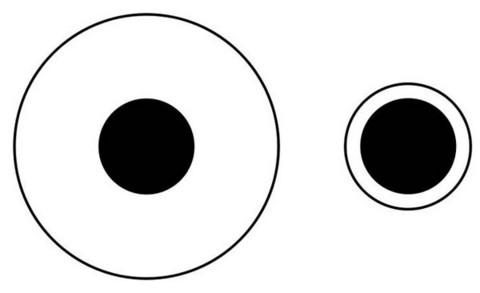
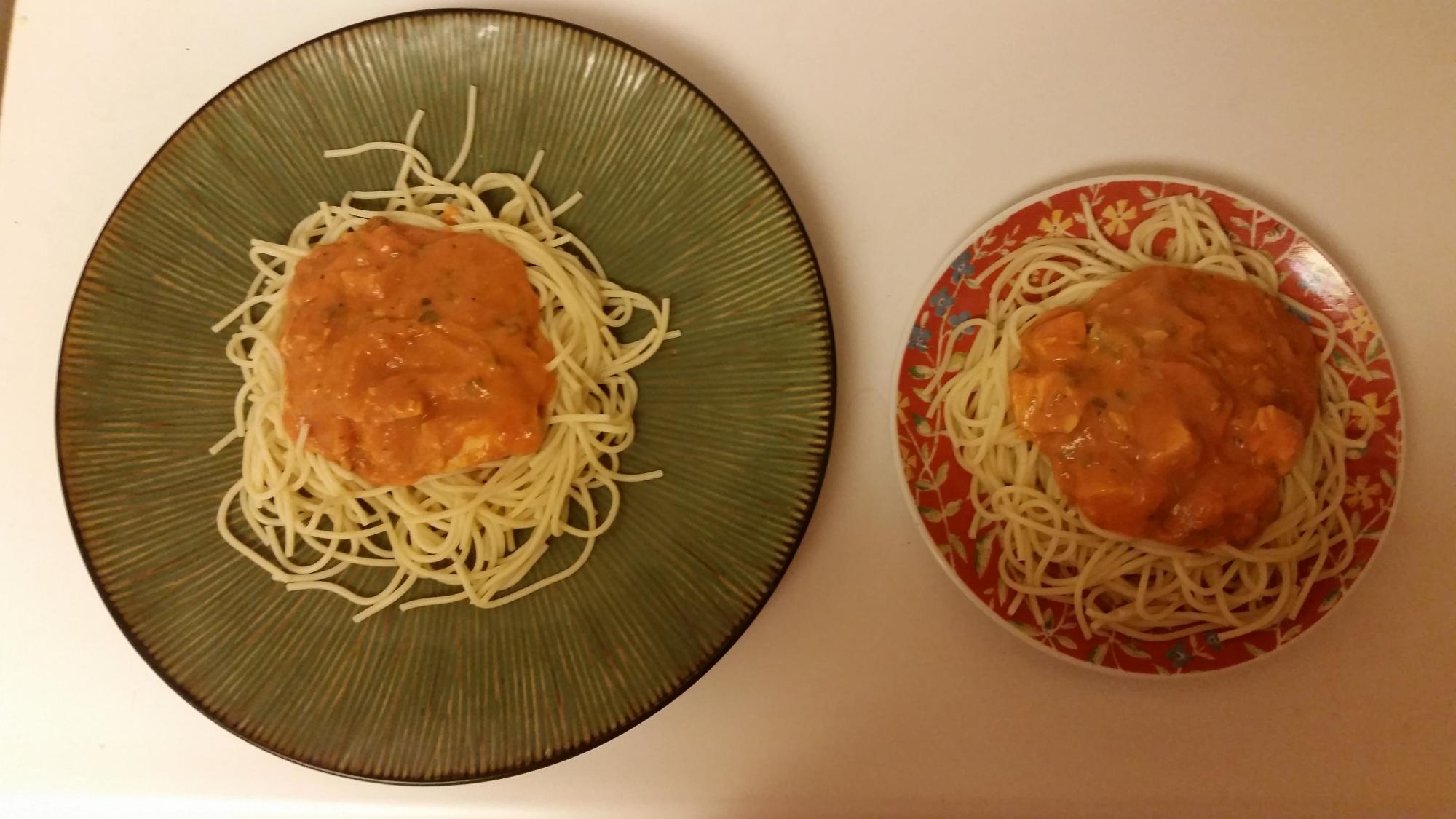
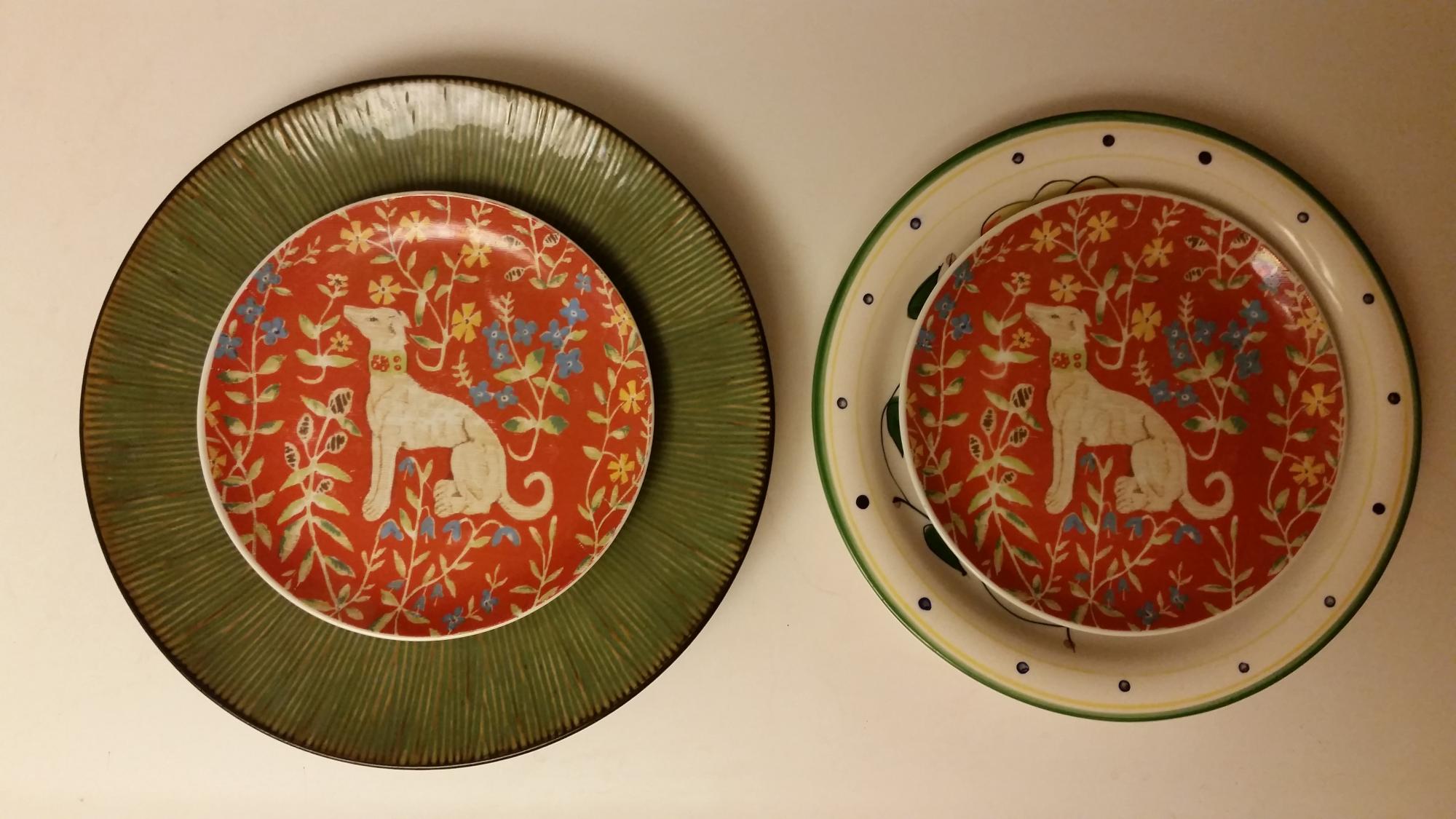
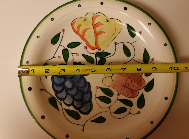
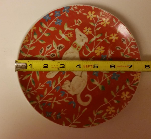
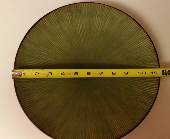
Food Journal
When it comes to weight loss and weight management, I don’t particularly like the phrase “going on a diet”. The term diet refers to all food that a person eats. So just by living and consuming food, I am already on a diet. Restrictive diets are not appealing to me either. My regular diet usually consists of the “right” foods, just maybe not all the time nor in the right volumes. And taking out one food category or only eating one type of food for a certain period of sounds unnatural and unsustainable. In the past I have had success with food journals and programs like “The Biggest Loser” and “My Fitness Pal,” which involve meticulous record keeping. It seems like the act of record keeping helps by making me more aware and more careful about my choices. That is one of the reasons I wanted to start this blog. I want to become more mindful of the food sliding past my lips, and hopefully lose the weight without restrictive avoidance of culinary deliciousness. As such, it is probably best to keep track of what I am eating and recording my progress. This isn’t going to be a quick “loss 20 pounds in 20 days” diet. Because the changes are gradual, the weight-loss will be gradual. I will most likely get side-tracked along the way or get frustrated by the slow progress. I apologize in advance for any sudden outbursts.
June 8, 2015: because all life changes start on a Monday!
Breakfast: Steel Cut Oats with strawberries
Lunch: lobster sandwich with coleslaw
Dinner: Lemon pepper chicken with rosemary potatoes and salad
Exercise: a.m. bike for 10 minutes. It is Monday. That’s about all I can do.
p.m. Yoga class
Monday weigh in: 159 lbs. (naked morning weight. It jumps to 162 at night.)
June 9:
Breakfast: Steel Cut Oats with strawberries
Lunch: lobster sandwich with coleslaw
Dinner: Broccoli Soup
Exercise: a.m. bike for 20 minutes. Super sore from yoga, but I need to get the blood flowing
p.m. Yoga class
June 10:
Breakfast: Steel Cut Oats with strawberries
Lunch: Barbecue style buffet- salad, hamburger, bun-less hotdog, potato salad.
Dinner: Lemon pepper chicken with rosemary potatoes and salad (leftovers)
Exercise: a.m. none. Going to Universal Studios and will be walking all day.
p.m. None. Skipped yoga class. We "tried" to get back in time, but traffic was bad.
June 11:
Breakfast: Steel Cut Oats with strawberries
Lunch: Broccoli Soup
Dinner: lobster sandwich with fries (craving fries after yoga, so we picked some up from Y’Not)
Exercise: a.m. bike for 20 minutes. Super sore from yoga, but I need to get the blood flowing
p.m. Yoga class
June 12:
Breakfast: Breakfast burritos with leftover rosemary potatoes, spinach, and egg
Lunch: Turkey avocado sandwich from Vons deli, handful of Jalapeño Kettle chips
Dinner: Chicken Fajitas with rice and beans
Exercise: a.m. bike for 60 minutes. Mild bike ride around Santa Catalina Island.
p.m. Yoga video
June 13:
Breakfast: half of a three egg omelet with spinach, onion, mushrooms, and ham. Half side of fruit and wheat toast
Lunch: leftover Chicken Fajitas
Snack: watermelon, celery, and jicama with cucumber ranch dip and Tajin (one of my new favorite seasonings!)
Dinner: Shrimp and pineapple fried rice
Exercise: a.m. bike for 60 minutes. Mild bike ride around Santa Catalina Island. Stroll around the botanical gardens and Wrigley memorial
p.m. Yoga video
June 14:
Breakfast: leftover half of a three egg omelet with spinach, onion, mushrooms, and ham. Half side of fruit and wheat toast
Lunch: leftover Chicken Fajitas, Shrimp and pineapple fried rice
Dinner: Rose Chicken Pasta
Exercise: yoga video and walking around Avalon Catalina
June 15:
Breakfast: One egg over medium with one piece of toast
Lunch: chicken salad cranberry sandwich with carrots
Dinner: Vegetable Minestrone soup
Exercise: a.m. bike for 20 minutes.
p.m. Yoga class
Monday weigh in: 157 lbs. – this surprised me. I thought I would have gained weight while on vacation.
June 16:
Breakfast: Steel Cut Oats with blueberries
Lunch: chicken salad cranberry sandwich with carrots
Dinner: Vegetable Minestrone Soup
Exercise: a.m. none. I woke up with a horrible headache. I sat on the couch for about an hour before getting ready for work. The headache lingered until about 11:00am
p.m. Yoga class
June 17:
Breakfast: Steel Cut Oats with blueberries
Lunch: Chicken avocado sandwich
Dinner: Garlic Ginger Beef Stir-Fry with brown rice
Exercise: a.m. bike for 30 minutes.
p.m. Yoga class
June 18:
Breakfast: Steel Cut Oats with blueberries
Lunch: Pre-Father’s day BBQ: coleslaw, Veggie packed tri-color pasta salad, hamburger, and cupcake
Dinner: Garlic Ginger Beef Stir-Fry with Brown rice (leftovers)
Exercise: a.m. bike for 30 minutes.
p.m. Yoga class
June 19:
Breakfast: Steel Cut Oats with blueberries
Lunch: 2 Chicken burritos
Dinner: not very hungry. Small bowl of soup and cherries
Exercise: a.m. bike for 20 minutes.
p.m. Yoga video
June 20:
Breakfast: Steel Cut Oats with blueberries
Lunch: Fuddruckers 1/3 lb. hamburger with onion rings and fries (shared)
Dinner: Vegetable Minestrone soup
Exercise: a.m. bike for 30 minutes.
p.m. None
June 21:
Breakfast: Steel Cut Oats with blueberries
Lunch: hot dog with salad and chili
Dinner: Ginger Salmon Puff
Exercise: a.m. bike ride Del Cerro Park – one time
P.M. – none
June 22:
Breakfast: Steel Cut Oats with blueberries
Lunch: dining out at New York Deli- half of a corned beef sandwich with macaroni salad and ¼ pickle
Dinner: Ginger Salmon Puff
Exercise: a.m. bike 30 minutes
p.m. Yoga class
Monday weigh in: 156 lbs.
June 23:
Breakfast: Steel Cut Oats with blueberries
Lunch: chicken avocado sandwich
Dinner: Vegetable Minestrone soup
Exercise: a.m. bike 30 minutes
p.m. Yoga class
June 24:
Breakfast: Steel Cut Oats with blueberries
Lunch: leftovers: one cup of Rose Chicken Pasta Sauce with added spinach, tomatoes, celery, and broccoli mixed with 2 cups of pasta salad
Dinner: Vegetable Minestrone soup
Exercise: a.m. bike 30 minutes
p.m. Yoga class
June 25:
Breakfast: Steel Cut Oats with blueberries
Lunch: chicken avocado sandwich
Dinner: Broccoli Chicken Peanut Stir Fry
Exercise: a.m. bike 30 minutes
p.m. Yoga class
June 26:
Breakfast: Steel Cut Oats with blueberries
Lunch: chicken avocado sandwich
Snack: veggies with ranch dressing, 2 cookies from Ralph's bakery, chipotle chips
"Dinner": Happy Hour! 2 "dirty bath water" beverages, 2 street tacos, fries and Irish nachos shared by table, but I am pretty sure I ate most of it.
Exercise: a.m. bike 30 minutes
p.m. stuffing face with alcohol and bar food.... mmm...
June 27:
Breakfast: breakfast smoothie: water, banana, mixed berries, protein powder
Lunch: hot dog with pasta salad
Snack: veggies with ranch dressing, 2 shortbread cookies with chocolate frosting
Dinner: 4 street tacos (2 shrimp, 1 beef, 1 chicken) with rice, beans, and chips and 4 drinks (Irish whiskey, Gingerale, lemonade, lime squeeze). Happy Birthday Marty!
Exercise: a.m. Yoga (30 minutes) and archery in Palos Verdes
June 28:
Late Breakfast: 2 pieced of wheat toast with onion, spinach, cheddar omelet
Lunch: skipped due to late breakfast
Dinner: Gazpacho and beef empanadas
Exercise: none
June 29:
Breakfast: 1 piece of wheat toast with 1 egg over medium
Lunch: chicken mole with rice and beans
Dinner: White bean soup
Exercise: a.m. 10 minutes on bike
p.m. Yoga class
Monday weigh-in: 156 lbs.
June 30:
Breakfast: Steel cut oatmeal with blueberries
Lunch: chicken salad sandwich
Dinner: Gazpacho and beef empanadas
Exercise: a.m. 30 minutes on bike
p.m. Yoga class
